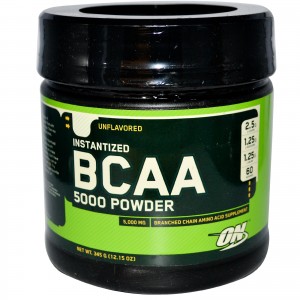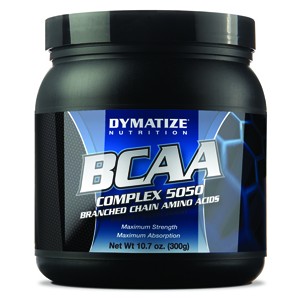By Kevin Cann – Steroidal.com Contributor
Branch Chain Amino Acids (BCAA) has been a popular supplement for quite some time. Gym goers and athletes around the planet have been taking BCAAs to attempt to increase muscle mass and decrease the catabolic effects of intense training. Do BCAAs actually improve performance and are they worth the money we spend on them? The good news is BCAAs can be purchased for under $20 and there has been quite substantial research done on them as a supplement.
BCAAs are a group of amino acids, the building blocks of protein. Specifically, the amino acids are leucine, isoleucine, and valine. They can be obtained from food products such as meat, fish, and eggs. They can also be purchased in supplement form. Some of these supplement companies market the increased performance gains associated with BCAA supplementation. However, this is not the case.
Research has continually shown that BCAA supplementation does not enhance athletic performance. Does this mean that is not a worthwhile supplement? Absolutely not. Research has shown that BCAA supplementation can be a major aid in muscle recovery. In fact, taking BCAA supplementation before and after exercise has been shown to decrease exercise induced muscle damage and increase protein synthesis. BCAA supplementation also modifies post-exercise cytokine production, showing that it may play an important role in decreasing the inflammatory process following physical activity [1]. This has even been shown to be the case in well-trained males [2]. Why would this be beneficial?
Decreasing muscle damage and aiding in protein synthesis can help to decrease muscle soreness and discomfort for days to follow. Pain changes movement patterns and if we are constantly in a cycle of being sore it will alter our movement patterns in the gym and lead us to decreased performance and increased injury risk. Just think about this logically, how much weight can you really lift when you are incredibly sore from the day before? Chances are nowhere near what you would if you were feeling fresh and ready to go. With that said, BCAA supplementation may allow you to train harder more often. This can be a good thing if hypertrophy is one of your exercise goals as training to muscle failure may lead to greater muscle gains [3,4].
 BCAA supplementation may not only be appropriate for people trying to workout hard and gain muscle mass. It also may be a good supplement for those looking to lose weight. The BCAAs play an important role in glucose homeostasis and body weight and there functions are altered under insulin resistant conditions [5]. Some research has gone so far as to vindicate BCAA supplementation as a cause of supplementation, but animal studies suggest that BCAA supplementation alone is not responsible for insulin resistance, but when combined with a high fat diet they do promote insulin resistance [6].
BCAA supplementation may not only be appropriate for people trying to workout hard and gain muscle mass. It also may be a good supplement for those looking to lose weight. The BCAAs play an important role in glucose homeostasis and body weight and there functions are altered under insulin resistant conditions [5]. Some research has gone so far as to vindicate BCAA supplementation as a cause of supplementation, but animal studies suggest that BCAA supplementation alone is not responsible for insulin resistance, but when combined with a high fat diet they do promote insulin resistance [6].
However, other studies are showing a positive role the BCAAs have on body weight, specifically the amino acid leucine. One study published in the journal of Nutrition concluded their study by stating that they may promote glucose recycling through the glucose-alanine cycle and they play a role in protein synthesis and can stabilize fasting and postprandial levels of blood glucose [7].
Recent studies have been showing that exercising in a fasted state may spare muscle when a carbohydrate/protein/leucine supplement is taken following training. One study looked at 6 males and performed a randomized crossover study looking at heavy resistance training and a supplement of 50g carbs, 33g protein, and 16g leucine. This study showed that exercising in a fasted state and taking this supplement post workout showed an increase in anabolic response [8]. For those looking to lose weight this may be an effective means to reach your weight loss goals. The research is contradictory in this area, but studies show that alternate day fasting leads to greater weight loss while performing the same exercise routine as control subjects [9].
Losing weight and building muscle are dynamic processes and there is a lot of individual variability. Genetics, sleep, stress, nutrition, and vitamin D all plays critical roles in our hormonal status and ability to lose weight and gain muscle mass. Each person will have to mess around with various workout plans and supplements. Exercising in a fasted state and taking a BCAA supplement may help some people lean out while sparing muscle mass. Try it and see how it goes.
In conclusion, BCAA supplementation may be worthwhile for those attempting to build more muscle mass. It can supply us with the muscle building amino acids for a relatively low cost. The cost of BCAA supplementation from a quick glance on Amazon ranged from $12 to $30. This is far cheaper than most other supplements and may yield much better benefits. This of course should be part of a diet that consists of high quality protein from meat, fish, and eggs. BCAA supplementation may also be able to help people lose weight. Leucine has been shown to play a critical role in glucose metabolism and body weight. The studies that have shown that BCAA supplementation leads to insulin resistance were only shown in settings where subjects were fed a high fat diet along with the supplement. Another question to ask here is what was the fat source? My guess would be it was not of the highest quality. BCAA supplementation may be able to spare muscle to allow us to workout in a fasted state and yield some greater potential weight loss. There are individual variables with weight loss and gaining muscle mass. Give it a try and let us know how it goes.
References:
[1]. J Sports Med Phys Fitness. 2008 Sep;48(3):347-51.
[2]. Journal of the International Society of Sports Nutrition 2012, 9:20 doi:10.1186/1550-2783-9-20
[3]. Med Sci Sports Exerc. 2005 Jun;37(6):955-63.
[4]. Eur J Appl Physiol Occup Physiol. 1995;71(4):337-41.
[5]. Front Med. 2013 Mar;7(1):53-9. doi: 10.1007/s11684-013-0255-5. Epub 2013 Feb 6.
[6]. Cell Metab. 2012 May 2;15(5):606-14. doi: 10.1016/j.cmet.2012.01.024.
[7]. J. Nutr. January 1, 2003 vol. 133 no. 1 261S-267S
[8]. European Journal of Applied Physiology March 2010, Volume 108, Issue 4, pp 791-800
[9]. Nutrition Journal 2013, 12:146 doi:10.1186/1475-2891-12-146







